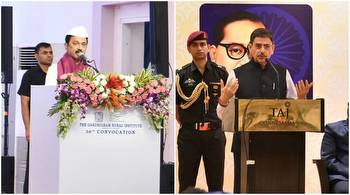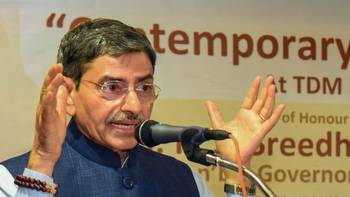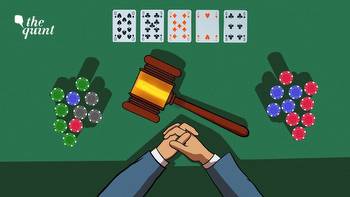ERGO Analysing Development Impacting Business: Tamil Nadu Bans Online Gambling
1.1 The Tamil Nadu Prohibition of Online Gambling and Regulation of Online Games Bill 2022 (Bill) received the assent of the Governor of Tamil Nadu, Mr R N Ravi, on 7 April 2023. Pursuant to the Madras High Court striking down the Tamil Nadu Gaming and Police Laws (Amendment) Act 20211 , the Tamil Nadu government constituted a fivemember committee led by former Justice K Chandru (Justice Chandru Committee) to assess the adverse effects of online gaming with stakes and advise on the possibility of introducing a new law to regulate online gambling.
1.2 Basis the recommendations of the Justice Chandru Committee, the Tamil Nadu government promulgated the Tamil Nadu Prohibition of Online Gambling and Regulation of Online Games Ordinance, 2022 on 1 October 2022 (Ordinance), and subsequently the legislative assembly introduced a bill to replace the Ordinance. The Tamil Nadu governor had returned the bill on 6 March 2023 to the legislative assembly citing issues of legislative competence. The assembly reintroduced the Bill with no amendments on 23 March 2023.
1.3 On 10 April 2023, the Bill was published in the Tamil Nadu government gazette and introduced as the Tamil Nadu Prohibition of Online Gambling and Regulation of Online Games Act 2022 (Act), the key features of which are set out below.
1.4 One of the stated intentions of the Act has been to address the increase in online gaming addiction in recent years, which has led many people to incur unsustainable debt and therefore, commit suicides. It is considered that the existing jurisprudence of game of chance versus game of skill does not render sufficient substance to deal with the current issues of online gambling, and a new conceptual framework is required in order to account for the latest information technology and its operation.
1.5 Given this rising concern, coupled with the exponential growth of this sector, the Act seeks to prevent any further social and financial distress, and health hazards to the State of Tamil Nadu and its population.
2. FEATURES OF THE ACT
2.1 The Act prohibits online gambling and playing of any online games of chance with money or other stakes, including Rummy and Poker.2 ‘Online games of chance’ include games which involve:
(a) elements of chance and skill, where the chance dominates the element of skill;
(b) an element of chance which can be eliminated only by superlative skill;
(d) cards, dice, wheel, etc., working on random outcome or event generator.
2.2 Per the Statement of Objects of the Act, an online version of any game cannot be compared with the offline version or where a random outcome is generated without the use of a random outcome generator. The Justice Chandru Committee report notes that the algorithm for random generators deployed in online games is already known to the developers, and therefore, amount to pseudo random generators as there is no mechanism available for auditing the same to prevent manipulation. Thus, the Act prohibits any games of chance which deploy such technologies.
2.3 Further, the Act prohibits all forms of advertisements which, promote or induce a person to play any game for money or other stake involving online gambling / an online game of chance including Rummy or Poker. Banks and other financial institutions are also prohibited from undertaking any transactions involving payment towards online gambling or any online game of chance as specified in the Schedule, i.e., Rummy or Poker.
2.4 The Act establishes a Tamil Nadu Online Gaming Authority which has been empowered inter alia to regulate online games, register local online games providers, identify online games of chance and recommend their inclusion in the schedule to the Act, resolve grievances / complaints against any online games provider, and advise the state government on matters pertaining to online gaming.
2.5 The Tamil Nadu Online Gaming Authority has powers as are vested in a civil court and can demand any information as deemed necessary from online games providers. Apart from this, the Act also establishes an appellate authority for any appeals which lie from the Tamil Nadu Online Gaming Authority.
2.6 Local online games providers are required to apply for a registration with the Tamil Nadu Online Gaming Authority. The issuance of a certificate of registration to an online games provider is subject to compliance with the provisions of the Act.
2.7 Non-local online games providers are prohibited from providing any online games contrary to the regulations (in addition to the general prohibition on online gambling and online games of chance specified in the Schedule, which applies to all games providers). Further, where a non-local online game provider has exercised “due diligence” or geo-blocked the service, they will not be deemed to have contravened these prohibitions. Due diligence has been defined as when the non-local online games provider has:
(a) informed customers that Tamil Nadu prohibits online gambling and certain online games;
(b) entered into contracts with customers stating that customers cannot use the service if they are physically present in Tamil Nadu;
(c) required customers to provide personal details / obtained data sufficient to establish their physical non-presence in Tamil Nadu; and
(d) taken any reasonably practicable measure to ensure that no person physically present in Tamil Nadu can use the service.
2.8 The following offences and penalties have been laid down in the Act:
(a) Indulging in online gambling / playing any online game of chance specified in the Schedule for money or other stakes is punishable with imprisonment of up to 3 months or a fine of up to INR 5,000 or both.
(b) Advertising in any media in contravention of Section 8 of the Act is punishable with imprisonment of up to 1 year or a fine of up to INR 5 lakhs or both.
(c) Providing online gambling service or any online game of chance specified in Schedule of the Act for money or other stakes is punishable with imprisonment of up to 3 years or with a fine of up to INR 10,00,000 or both.
(d) Non-local online games provider shall be punished for violating the provisions of the Act subject to the Central Government / authorised officer exercising its power under the Information Technology Act 2000.
3. IMPACT OF THE ACT / COMMENTS
3.1 The following offences and penalties have been laid down in the Act:
3.2 Unlike in the case of Tamil Nadu, states such as Meghalaya, Sikkim and Nagaland have adopted a permissive approach by amending their state legislations on online gaming3 to include a registration and licensing regime for online games, including the creation of dedicated government bodies for administration and dispute resolution. Conversely, the Tamil Nadu government has set a conservative precedent here by prohibiting games such as ‘rummy’ and ‘poker’ explicitly in the Act.
3.3 Industry stakeholders have expressed their disappointment with this development. Major national gaming associations, including the All India Gaming federation (AIGF) and EGaming Federation (EGF), have expressed their intention to challenge the new law.
3.4 The Act is likely to be subject to constitutional challenges before Indian courts, especially in light of the expansive jurisprudence already established by Indian courts in the last few decades upholding the status of games like rummy and poker as games of skill under Indian law. For example, in State of Andhra Pradesh v K Satyanarayana, the Supreme Court has held that ‘rummy’ is a game of skill.4 Similarly, the High Courts of Karnataka and Madras have observed that ‘poker’ would amount to a game of skill, although this can be considered obiter. 5
3.5 For the time being, while the Act remains fully in force, the distinction between games of skill versus games of chance will continue to be relevant in light of the definition provided for online game of chance under the Act. However, the test of predominant skill will not be applicable to the games of rummy and poker in the state of Tamil Nadu, given that the Act has expressly prohibited these games within the state. Other online games, such as fantasy sports games, will continue to be governed by the test of ‘games of mere skill’ as established under Indian law.
3.6 As always iterated by the stakeholders of the industry, a robust, consistent and unambiguous set of laws is the need of the hour for this sector in order to ensure that the common man is well-protected from any potentially exploitative or addictive activity, while at the same time ensuring that the ease of doing business in this sector is maintained and encouraged within a defined and predictable legal and regulatory framework.






























